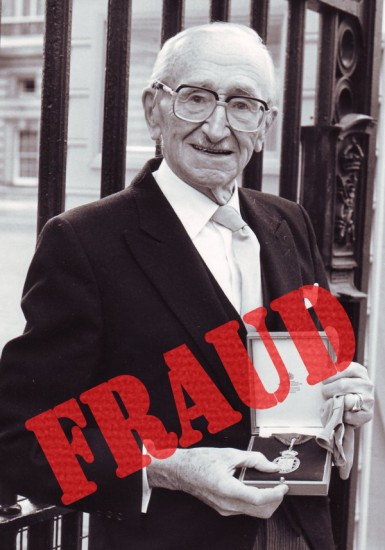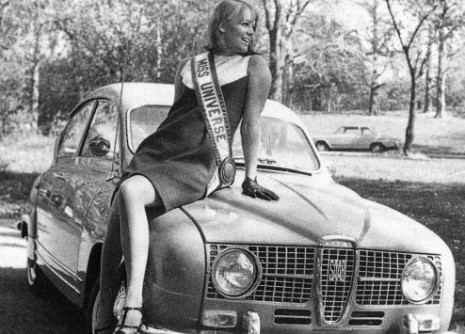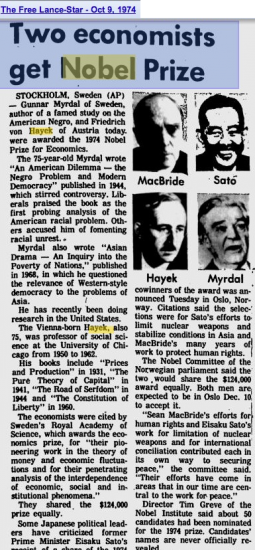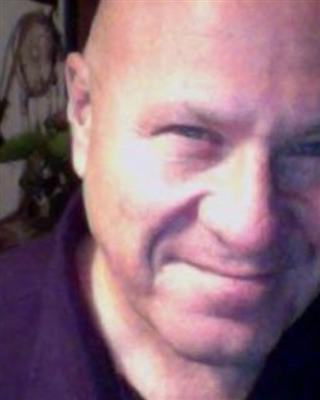Capitalist mythologies and lies exposed—
Editor’s Note: Correspondent Levine does a pretty smashing job of unmasking this phony prize, but of late we have seen that otehr prices, notably the “Peace Prize” is also mighty suspect. Fact is, they are all subject to political chiseling. —PG

Fanatic Friedrich Hayek: like all bourgeois economists, a fraud from the start.
By Yasha Levine, the eXileD
It’s Nobel Prize season again. News reports are coming out each day sharing the name of the illustrious winner of the various categories — Science, Literature, etc. But there’s one of the prizes that’s a little different. Well, that’s putting it lightly… you see, the Nobel Prize in Economics is not a real Nobel. It wasn’t created by Alfred Nobel. It’s not even called a “Nobel Prize,” no matter what the press reports say.
The five real Nobel Prizes—physics, chemistry, literature, peace, and medicine/physiology—were set up in the will left by the dynamite magnate when he died in 1895. The economics prize is a bit different. It was created by Sweden’s Central Bank in 1969, nearly 75 years later. The award’s real name is the “Sveriges Riksbank Prize in Economic Sciences in Memory of Alfred Nobel.” It was not established by Nobel, but supposedly in memory of Nobel. It’s a ruse and a PR trick, and I mean that literally. And it was done completely against the wishes of the Nobel family.
Sweden’s Central Bank quietly snuck it in with all the other Nobel Prizes to give retrograde free-market economics credibility and the appearance of scientific rigor. One of the Federal Reserve banks explained it succinctly, “Few realize, especially outside of economists, that the prize in economics is not an “official” Nobel. . . . The award for economics came almost 70 years later—bootstrapped to the Nobel in 1968 as a bit of a marketing ploy to celebrate the Bank of Sweden’s 300th anniversary.” Yes, you read that right: “a marketing ploy.”
Here’s a Nobel family member describing it: “The Economics Prize has nestled itself in and is awarded as if it were a Nobel Prize. But it’s a PR coup by economists to improve their reputation,” Nobel’s great great nephew Peter Nobel told AFP in 2005, adding that “It’s most often awarded to stock market speculators. . . . There is nothing to indicate that [Alfred Nobel] would have wanted such a prize.”
Members of the Nobel family are among the harshest, most persistent critics of the economics prize, and members of the family have repeatedly called for the prize to be abolished or renamed. In 2001, on the 100th anniversary of the Nobel Prizes, four family members published a letter in the Swedish paper Svenska Dagbladet, arguing that the economics prize degrades and cheapens the real Nobel Prizes. They aren’t the only ones.
Scientists never had much respect for the new economic Nobel prize. In fact, a scientist who headed Nixon’s Science Advisory Committee in 1969, was shocked to learn that economists were even allowed on stage to accept their award with the real Nobel laureates. He was incredulous: “You mean they sat on the platform with you?”
That hatred continues to simmer below the surface, and periodically breaks through and makes itself known. Most recently, in 2004, three prominent Swedish scientists and members of the Nobel committee published an open letter in a Swedish newspaper savaging the fraudulent “scientific” credentials of the Swedish Central Bank Prize in Economics. “The economics prize diminishes the value of the other Nobel prizes. If the prize is to be kept, it must be broadened in scope and be disassociated with Nobel,” they wrote in the letter, arguing that achievements of most of the economists who win the prize are so abstract and disconnected from the real world as to be utterly meaningless.
The question is: Why would a prize that draws so much hatred and negativity from the scientific community be added to the Nobel roster so late in the game? And why economics?
To answer that question we have to go back to Sweden in the 1960s.

Miss Universe 1966: Margareta Arvidsson
Around the time the prize was created, Sweden’s banking and business interests were busy trying to ram through various free-market economic reforms. Their big objective at the time was to loosen political oversight and control over the country’s central bank.
According to Philip Mirowski, a professor at the University of Notre Dame who specializes in the history economics, the “Bank of Sweden was trying to become more independent of democratic accountability in the late 60s, and there was a big political dispute in Sweden as to whether the bank could have effective political independence. In order to support that position, the bank needed to claim that it had a kind of scientific credibility that was not grounded in political support.”
Promoters of central bank independence made their arguments in the language of neoclassical market efficiency. The problem was that few people in Sweden took their neoclassical babble very seriously, and saw their plan for central bank independence for what it was: an attempt to transfer control over economic matters from democratically elected government and place into the hands of big business interests, giving them a free hand in running Sweden’s economy without pesky interference from labor unions, voters and elected officials.
And that’s where the Swedish Central Bank Prize in Economic Sciences came in.
The details of how the deal went down are still very murky. What is known is that in 1969 Sweden’s central bank used the pretense of its 300th anniversary to push through an independent prize in “economic science” in memory of Alfred Nobel, and closely link it with the original Nobel Prize awards. The name was a bit longer, the medals looked a little different and the award money did not come from Nobel, but in every other way it was hard to tell the two apart. To ensure the prize would be awarded to the right economists, the bank managed to install a rightwing Swedish economist named Assar Lindbeck, who had ties to University of Chicago, to oversee the awards committee and keep him there for more than three decades. (Lindbeck’s famous free-market oneliner is: “In many cases, rent control appears to be the most efficient technique presently known to destroy a city — except for bombing.”)

<<<<For the first few years, the Swedish Central Bank Prize in Economics went to fairly mainstream and maybe even semi-respectable economists. But after establishing the award as credible and serious, the prizes took a hard turn to the right.
Over the next decade, the prize was awarded to the most fanatical supporters of theories that concentrated wealth among the top 1% of industrialized society of our time.
In 1974, five years after the prize was first created, it was awarded to Friedrich von Hayek, the leading laissez-faire economist of the 20th century and the godfather of neoclassical economics. Milton Friedman, who was at the University of Chicago with Hayek, was not far behind. He won the prize just two years later, in 1976.
Both Hayek and Friedman were huge supporters of the political independence of central banks. In fact, they built their careers on bashing government intervention in economic matters. Hayek developed a whole business cycle theory that blamed government and government-controlled banking systems for all economic problems. Friedman came out with a whole new subsection of neoclassical economics called “Monetarism” that had a scientific formula worked out, specifying exactly how much money central bankers needed to keep floating around in the economy to keep inflation low and unemployment high enough to keep big business happy. No democratic control over banking policies needed, just let the free-market do its thing! The Swedish central bankers couldn’t get better spokesmen for their cause.
But Hayek and Friedman’s usefulness went way beyond Sweden.
At the time of the prizes, neoclassical economics were not fully accepted by the media and political establishment. But the Nobel Prize changed all that.
What started as a project to help the Bank of Sweden achieve political independence, ended up boosting the credibility of the most regressive strains of free-market economics, and paving the way for widespread acceptance of libertarian ideology.
Take Hayek: Before he was won the award, it looked like Hayek was washed up. His prospect of ever being a mainstream economist was essentially over. He was considered a quack and fraud by contemporary economists, he had spent the 50s and 60s in academic obscurity, preaching the gospel of free-markets and economic Darwinism while on the payroll of ultra-rightwing American billionaires. Hayek had powerful backers, but was stuck way out on the fringes of reactionary-right subculture.
But that all changed as soon as he won the prize in 1974. All of a sudden his ideas were being talked about. Hayek was a celebrity. He appeared as a star guest on NBC’s Meet the Press, newspapers across the country printed his photographs and treated his economic mumblings about the need to have high unemployment as if they were divine revelations. His Road to Serfdom hit the best-seller list. Margret Thatcher started waving around his books in public, saying “this is what we believe.” He was back on top like never before, and it was all because of the fake Nobel Prize created by Sweden’s Central Bank.

“Unemployment is necessary karmic price of past inflationary policies”
Billionaire Charles Koch brought Hayek out for an extended victory tour of the United States, and had Hayek spend the summer as a resident scholar at his Institute for Humane Studies. Charles, a shrewd businessman, quickly put the old man to good marketing use, tapping Hayek’s mainstream cred to set up Cato Institute in 1974 (it was called the Charles Koch Foundation until 1977), a libertarian thinktank based on Hayek’s ideas. [Read eXiled eXclusive: Charles Koch told Hayek to use Social Security.]
Even today, Cato Institute pays homage to the Swedish Central Bank Prize’s marketing role in the mainstreaming of Hayek’s ideas and Hayek’s influence on the outfit:
The first libertarian to receive the Nobel Prize was F.A. Hayek in 1974. In the years leading up to the prize announcement, Hayek had reached a professional and personal nadir. Unable to maintain an appointment in the United States, Hayek had returned to Austria to take up a position at the University of Salzburg, Austria. With the announcement of the prize in 1974, however, Hayek’s work, and the fortune of Austrian economics, took a remarkable turn.
Hayek’s influence on Cato is profound. Two of Cato’s first books were by Hayek: A Tiger by the Tail: The Keynesian Legacy of Inflation & Unemployment and Monetary Policy: Government as Generator of the “Business Cycle.” Perhaps more than any other intellectual in the twentieth century, Hayek has inspired Cato and its researchers to develop policies that ensure a free society. When Cato moved into its current location in 1992, its auditorium was named in Hayek’s honor.
Friedman’s Nobel Prize had a similar impact. After getting the prize in 1976, Friedman wrote a best seller, got his own 10-part PBS series “Free to Choose” and became President Ronald Reagan’s economic advisor, where he had a chance to put the free-market policies he developed in Chile under Pinochet.
Like Hayek, Friedman was a big Pinochet fanboy. He would spend the rest of his time denying it, but he was deeply involved and invested in the Pinochet’s totalitarian free-market experiment. Chilean economist Orlando Letelier published an article in The Nation in 1976 outing Milton Friedman as the “intellectual architect and unofficial adviser for the team of economists now running the Chilean economy” on behalf of foreign corporations. A month later Letelier was assassinated in D.C. by Chilean secret police using a car bomb.
President Bush gives his pet free-market troll a pat on the head…
Friedman’s monetary theory was used by Federal Reserve Bank Chairman Paul Volcker to restrict the money supply, plunging American into a deep recession, doubling the unemployment rate, and had the added bonus of getting Reagan elected President. . . . And Hayek and Friedman were just the beginning.
For instance, in 1997 two economists won an award for their derivative risk models that minimized risk, just before derivatives would explode in the 2000s real estate-bubble.
The award was shared by economists Robert Merton and Myron Scholes for their work in figuring out how to value derivatives so as to minimize risk. The two economists used their Nobel-worthy economic models to run “the world’s biggest hedge fund,” which was called Long Term Capital Management (LTCM). And the fund really lived up to its name. Nine months after winning the Swedish Central Bank Prize in Economics, LTCM went belly-up, racking up over $1 billion in losses over a period of just two days. It was of course bailed out by then-Federal Reserve Chairman Alan Greenspan, who considered LTCM “too big to fail.”
Then there’s Vernon Smith. In 2002, Vernon Smith, adored and funded by Libertarians like Charles Koch, won the “Nobel” — his patron looked at the money he spent funding Smith’s academic career as a successful speculatory venture, saying simply: “The Koch Foundation’s gift was an excellent investment.” Smith’s research basically entailed setting up theoretical “wind tunnels” to test how free-markets would respond in various conditions—all in a way that has nothing to do with reality.
As of 2011, 10 out of the 69 economists who’ve won the fake Nobel prize are Koch-connected libertarians.
It will take a brave act to bring this sham to the attention of the public. One year, one of the prize winners will have to speak out, and explain this ruse to the public as he wins the award.
This article was first published on AlterNet
***
ABOUT THE AUTHOR
Yasha Levine is an eXiled editor, a noted investigative journalist, and co-founder of the supremely useful S.H.A.M.E. [the media] Project. Read his book: The Corruption of Malcolm Gladwell.

Book Description
Publication Date: August 9, 2012
It may be hard to imagine that Malcolm Gladwell, a staff writer for the New Yorker and bestselling author beloved by millions of readers, could be a crooked propagandist for some of the most toxic and destructive industries on the planet. Investigative journalist Yasha Levine didn’t think it was possible, either—at least not until he happened to stumble across an old article by Gladwell defending the tobacco industry, and discovered a paper trail that led him to the shocking truth…
Levine presents well-sourced evidence showing that Gladwell spent his entire career systematically and unapologetically shilling for Big Tobacco, Pharma, health insurance companies and defending Wall Street financial fraud, all while earning seven figures as one of the most sought-after corporate speakers in America, frequently being paid by the same companies and industries that he covers as a journalist. Levine unravels years of Gladwell’s work as a covert propagandist, and analyzes the techniques Gladwell uses to confuse readers, redirect their attention and slyly rewrite history for the benefit of his sponsors—without anyone getting wise to his racket.
Let’s keep this award-winning site going!

Yes, audiences applaud us. But do you?If yes, then buy us a beer. The wingnuts are falling over each other to make donations…to their causes. We, on the other hand, take our left media—the only media that speak for us— for granted. Don’t join that parade, and give today. Every dollar counts.
|
|
| Use the DONATE button below or on the sidebar. And do the right thing. Even once a year. |

Use PayPal via the button below.

THANK YOU.
//
 However, Wheeler said on Hannity, that every time he spoke with DC Metro Police about connecting Seth Rich with WikiLeaks, he was immediately “shut down.” He notes that the FBI wouldn’t even be involved in a regular homicide unless there were an aspect of the case, linking it to something of national significance. Wheeler says that when he first reached out to the DC Police last March, his call went unanswered for several days, during which time he received a call from Seth’s parents, saying that they’d received a call from a high-level operative of the DNC, asking them what Wheeler was doing, “Snooping around.”
However, Wheeler said on Hannity, that every time he spoke with DC Metro Police about connecting Seth Rich with WikiLeaks, he was immediately “shut down.” He notes that the FBI wouldn’t even be involved in a regular homicide unless there were an aspect of the case, linking it to something of national significance. Wheeler says that when he first reached out to the DC Police last March, his call went unanswered for several days, during which time he received a call from Seth’s parents, saying that they’d received a call from a high-level operative of the DNC, asking them what Wheeler was doing, “Snooping around.”









